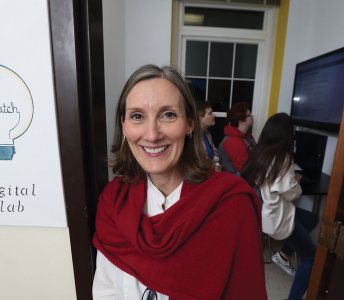Class Acts
Messy learning
Merkel takes Russian lit outside the box and inside the supply closet

When some people see a tiny, neglected supply closet near their office, they might use it to store a vacuum. For Associate Professor of Comparative Literature Stephanie Merkel, it was ground zero for learning innovation.
Now, thanks to Merkel and colleagues, the former Sturges Hall supply closet is a mini digital humanities lab, complete with a wall-mounted monitor, Ikea furniture, and a hightech name: the Lit Hatch. This type of project is what Stephanie Merkel is all about—hands-on innovation and constant learning.
An OWU professor for 22 years and expert in Russian literature, Merkel likes to think beyond the traditional essay assignment. The Lit Hatch, and the opportunity it provides students to use digital storytelling software like Scalar and Twine, is just the latest chapter in a thick volume of innovations Merkel has used to engross students in the literature and create projects that stretch their creativity and expand their skills.
In one course, Merkel’s students studied 18th-century “it” narratives—a widely popular genre of stories narrated by material objects—through the lens of textiles. The final exam took the form of a fashion show, with students creating handmade clothing items, composed of craft paper and pages of text. A student-made black coat and corset still decorate her office.
In another course, to help students explore relationships and connections between Russian noblewomen, Merkel approached letter writing as a literary genre. After delving deep into words from Catherine the Great’s inner circle, students met for dinner with their final papers “letter locked,” a way 18thcentury nobles tamper-proofed their correspondences with a series of holes and cut corners.
I love the saying, ‘When one teaches, two learn.’
Associate Professor of Comparative Literature
Merkel believes that learning is a messy process, one that demands we try new things.
“One of the things I learned along the way is that mess is good,” she says, explaining that when she and her students end class with more questions than they started with, it means they’re on the right track.
For Merkel, the messy process of learning is also collaborative, and she learns alongside her students.
“I love the saying, ‘When one teaches, two learn.’ I always try to teach from a place where I’m learning still,” she says. “I’m the guide, but we’re all on the trip together.”
Her hands-on projects serve another purpose: to help students gain confidence in their ability to create and think. This confidence is something that will help them in any career. For Merkel, it’s all about “the ways we can take the things we are doing and express the knowledge in different ways.”
Collaboration, innovative thinking, and especially storytelling, Merkel says, are necessary for success in many careers. Whether you are a research scientist or an ad executive, “you can’t function at all as a human being if you cannot tell a story.”
Most employers understand that literature students can write and read well, but Merkel hopes her students show them they can think well, too, “as logically as those in the sciences and as creatively as those in fine arts.”
Looking at the Lit Hatch, she adds, “I like to do things where students can say to a future employer, ‘I did this project. Would you like to see this interactive game I made?’”
By Natalie Kopp
